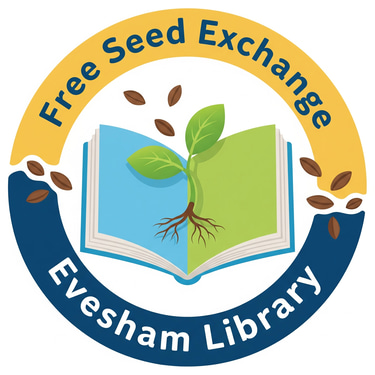Frequently Asked Questions
Who Supports Free Seed Exchange?
This project is a true community effort! It started as an idea from a Garden Club of Marlton member in July 2024 and quickly grew with the support of many local groups and individuals. We're grateful for the collaboration of the Evesham Green Team, Evesham Environmental Commission, the Burlington County Library System, the Native Plant Society, Girl Scout Troop #2381, and the Friends of the Library, all of whom helped make this pilot program a reality at the Evesham Library.
What kind of seeds are available?
The selection varies, but we focus on providing native and common pollinator seeds to help our local ecosystem thrive and survive. You'll find a wide variety of native flowers and herbs, including seeds for hummingbirds, butterflies, and moths native to our area, along with unique varieties donated by local gardeners like you.
What is a "Free Library Seed Exchange"?
It's a program that allows gardeners to get free seeds and, when they are able, to share their own extra seeds with others. It's like a library, but for seeds! Our goal is to promote community gardening and biodiversity.
How do I know the seeds are good?
All seeds are donated by community members, so we cannot guarantee a specific germination rate. However, we ask all contributors to label their seeds with as much information as possible, including the plant name, variety, and year collected.
Why is the Latin name important for native flowers?
Using the Latin name ensures we're all talking about the exact same plant. Many native plants have multiple common names, and the Latin name is the universal way to prevent confusion. The Latin name is crucial for native plants because it ensures everyone is talking about the exact same plant, preventing confusion caused by multiple common names. However, the Latin name becomes even more important when distinguishing between straight species and hybrids or cultivars
How do I donate seeds?
You can donate seeds by placing them in one of the provided paper packets in our small metal box. Please be sure to label your packets with the common name, the year the seed was harvested, and the Latin name if it's a native plant. The year is required so we can track the viability of the seeds and know when it's time to remove them from the library.
What is the difference between a "straight species" and a "hybrid" or "cultivar"?
When we refer to a native plant's "straight species," we are talking about the plant as it is found in the wild. For example, Echinacea purpurea is a straight species of purple coneflower. These are the most beneficial for our ecosystem because they have evolved alongside our local insects and birds, providing the precise nectar, pollen, and foliage that our native pollinators need.
Hybrids or "cultivars" are plants that have been selectively bred by humans for specific traits, like a different flower color (Echinacea 'White Swan') or a shorter size. While they can be beautiful additions to a garden, these changes can sometimes make them less recognizable or less nutritious for our native pollinators, who are adapted to the original straight species.
How does it work?
You can visit the library and choose from a variety of native flower, pollinator-friendly and herb seeds. You don't need to bring seeds to participate, especially when you're just starting out. Our motto is: take what you need, share what you can.
Ecosystems - where nature works together
info@thegardenclubofmarlton.org
© 2025. All rights reserved.
marltonseedexchange@gmail.com
